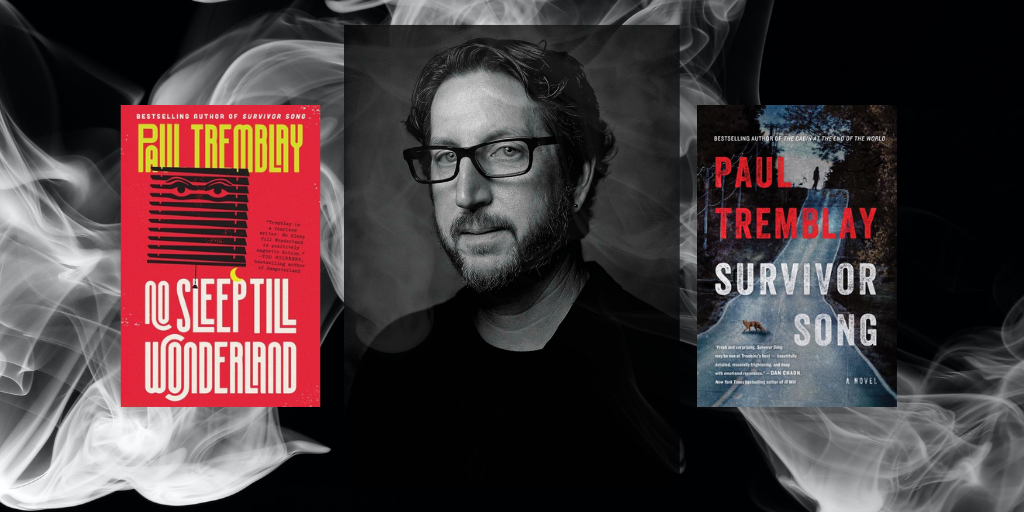Paul Tremblay on Putting Story First, Writing Atmosphere, and His New Novel
There are times in your life when you know you’re reading a brilliant author. Whether you’re an eight year-old reading her first Stephen King or a forty-something reading her first Paul Tremblay, you just know. Tremblay’s books grabbed me from the get-go. His intensely atmospheric writing style, exceptional characterization, and his knack for seamlessly blending genres are just a few of the elements that make him such a talented writer.
Paul’s bibliography is impressive. I adore A Head Full of Ghosts because it was my gateway drug into Paul’s writing and once I’d devoured it I was hungry for more. One of my favorite books–the book that shattered my heart–is The Cabin at the End of the World. I recently finished reading Disappearance at Devil’s Rock and it swallowed me whole. And one of the best short story collections I’ve read recently is Growing Things and Other Stories. While I was reading these stories I felt as if Paul was taking me on a trip through his imagination and thought process. After each story, I flipped to the end of the book for his explanations of each one. In this collection, Paul experiments with structure, narratives, metafiction, and reimagined worlds.
He was kind enough to answer a few questions for me in the spring of 2021.
Janelle Janson: How have you been holding up during the pandemic? What is the first thing you want to do once things safely open up?
Paul Tremblay: I’ve been hanging in there, but have aged five years in the one-plus. I am very fortunate to have been gainfully employed and that my loved ones are healthy (knock on all the wood). It certainly was/is a mad time to be teaching in person (mostly) at my small school and writing a novel. Hopefully, I somehow did a good job with both.
Small-scale, I want to go back to the movies, or see a band in a small, dark, and dank bar. Larger scale, I want to visit NYC or LA as soon as I can.
JJ: I’m with you on seeing a band in a dive bar. Live music, beer, and books are my jam. Did you always want to write horror?
PT: I didn’t mess around with writing until I was in my mid-20s, but when I started writing, yes, I viewed myself as a horror writer. I’ve been a horror fan and a scaredy cat for as long as I can remember. A kid/teen weaned on the early days of cable TV, my first and primary horror exposure was movies. I later spent an intensive two years in grad school struggling with math but reading all the horror I could get my hands on. Though I wanted to be a punk guitar hero before a writer, but that didn’t really work out, so, fine, write horror.
At a point about five years into my fledgling writing career, I decided that instead of a horror writer, I was a writer who wrote horror. That was an important distinction for me, and it meant I wouldn’t force a story into being a horror story. The story-first mindset helped make me a better writer, insofar as I was more attuned to what the story needed and not necessarily what I wanted.
JJ: Which author or authors inspire you the most? Have you met any of them online or in person?
PT: Too many to name them all, but I’ll name a few. Joyce Carol Oates’s “Where Are You Going, Where Have You Been?” in concert with Stephen King’s The Stand turned me into a reader.
Without those two works, I wouldn’t be here. Here in my office typing this answer. I met Joyce briefly in her autograph line at the Los Angeles Times Festival of Books. I know Stephen online and we’re email pals. Pals, right, Stephen?
I count myself as being incredibly fortunate that many of my friends are wonderful writers and people who inspire and push me to be better. A partial list includes John Langan (who lets me lean on him when I need to), Sarah Langan, Laird Barron, and Nathan Ballingrud.
JJ: What was your favorite childhood book?
PT: The Monster at the End of this Book by Grover. And honestly, I just bought a new copy, and it still holds up. Also, The Hobbit. My father was a card-carrying (or pin-carrying; he had a fan club pin that read ‘Frodo Lives’), pipe-smoking (and yeah, I would come to find out years later that his pipe-weed wasn’t just a Hobbit reference) Tolkien fan. So, I loved it by osmosis. The book, not the weed. Really!
JJ: The Monster at the End of this Book is my husband’s favorite childhood book as well. We just bought a copy for our new niece that’s on the way. If you couldn’t teach, coach, or write, what job would you love to do?
PT: I mentioned my punk rock dreams earlier, but that’s not really a job, is it? I’m assuming by ‘write’ we mean fiction, yeah? I’ll cheat a little and say a sportswriter, or maybe an obnoxious know-it-all sports radio hack. I tend to keep my sporting opinions to myself, or off the social media sphere, anyway, but I’ve been a lifelong sports fan and sports media junkie.
JJ: Which horror book scares you the most?
PT: When I first tried to read King’s It as an eighteen-year-old, having just returned home after my back surgery, I quit after the first chapter because I was too scared. (I did eventually read the book years later.) More recently, Nathan Ballingrud’s novella “The Visible Filth” freaked the hell out of me, and Sara Gran’s Come Closer is Creepy with a capital C.
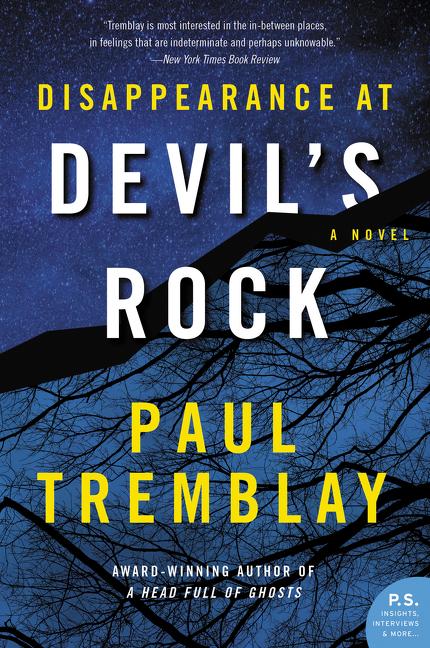
JJ: I am obsessed with the horror genre in both books and movies. What is your favorite horror movie?
PT: I can’t pick just one. You get a top three without an order. The Thing is the most obvious/popular choice of the three here. I admire the atmosphere, intensity, forward drive, and how all that menace, tension, and dread is still there even after untold number of viewings. Lake Mungo is a movie that I’ve been obsessed with for more than a decade now, and my novel Disappearance at Devil’s Rock is certainly Mungo-inspired. Such a sad, moving, and eerie film. I was going to go somewhat obscure with my third (Ravenous (1999), which feels more relevant now than it was when released, and I wrote parts of three novels to the movie’s soundtrack, and yes, with this parenthetical I slipped an extra movie onto my list! muhahaha) but I can’t leave out Jaws because if I did a shark would eat me. It remains the movie that has given me the most nightmares and the movie I’ve seen the most. I periodically become re-obsessed with the film and do things like read Robert Shaw’s play The Man in the Glass Booth or listen to the Jaws metal-opera The Great Fish by the band Squalus.
JJ: What is your favorite horror subgenre? Is there a subgenre you don’t like?
PT: Supernatural horror tends to be my favorite. Or monster movies. Who doesn’t like a good monster movie?
I don’t love slashers (sorry) like most horror fans do. There are some great slasher movies of course, but I think it’s a short list, frankly.
JJ: Do you have any favorite indie publishers?
PT: Word Horde continues to impress and publishes great stuff like John Langan’s The Fisherman and Carrie Laben’s A Hawk in the Woods. Others who publish exciting stuff include Lethe Press, Grimscribe Press, and Influx Press (UK).
JJ: What is the title of your very first unpublished story?
PT: “Prima Donna.” A terrible, no good story about death personified confronting a serial killer who had killed someone he wasn’t supposed to. But it was the first story I ever wrote. I tapped out eight pages of it on an old Brother word processor with a screen the size of a cereal box top and managed to not save it and lost it all. I was dismayed to say the least. I don’t believe in signs from the universe, but I did think at the time if there were signs from the universe, what did this bullshit one mean? Do I give up, or do I practice perseverance and write it all again? I wrote it all again. Now you’re stuck with me.
JJ: Do you ever plan to write full time or do you enjoy teaching too much?
PT: *Whispering* We don’t know who is listening or reading this…
At some point, I would like to try writing full time. I don’t know when that point will be. Having the teaching job, one I enjoy most days (or barely more than half of the days, which, technically qualifies as ‘most’), is a nice safety net if I screw up writing. The job has allowed me to write what I want to write and when without as much of the business pressures of publishing creeping in. How many folks get to say that? I don’t know, I’m genuinely asking. Seriously, though, writing without the anxiety of having to help support the household and without wondering where I’m getting my shitty health insurance, is a nice peace of mind to have. That said, with the time needed for both jobs seemingly increasing along with the stress of the workloads, something might have to give sooner rather than later.
JJ: You write like a full time writer, so I can’t even imagine what you could do without that extra workload. I think it’s so cool you are multitalented. I mean you’re a successful writer who excels at and teaches math. When did you learn you have a proclivity for mathematics and what made you start writing?
PT: Thank you. I used to joke that I was a half-assed teacher and a half-assed writer, but I stopped making that joke because there might’ve been too much truth to it.
I went to public high school at a time when the pressure to apply to college was not even in the same universe as it now. I applied to a couple of safety schools, two private ones in northern New England (rejected by both), and two schools I chose because I liked their basketball teams. I got into those basketball schools. And I stuck with math as a major because I was good at it in high school and I had no idea what I wanted to do career-wise. I ended up graduating as a double major: Mathematics and Humanities. The latter was a hodgepodge of random liberal arts courses, but the last class I took, introduced me to the Joyce Carol Oates story I previously mentioned.
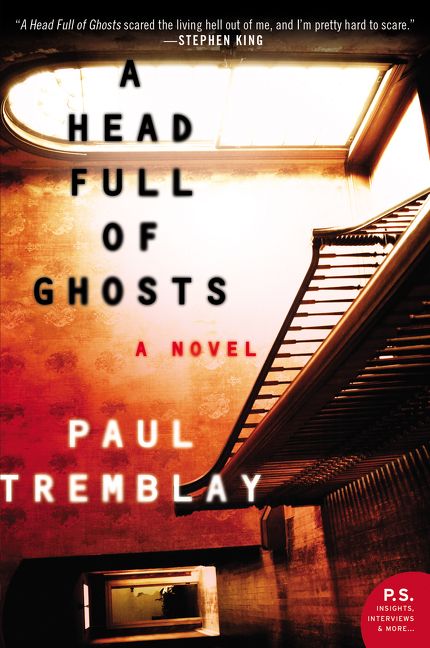
I started writing after falling in love with reading in graduate school. Why? I honestly don’t know, or I can’t answer that succinctly. Without it being too much of a sales pitch, my forthcoming novel The Pallbearers’ Club is sort of thematically about why write, or about my weird relationship with writing (even though the book isn’t about a writer).
Let’s leave it at this: It took me a long time to muster enough self-confidence to believe myself worthy of having a go at my creative passions: music and reading novels/short stories. I found out I was a better writer than musician, and dumbly stuck with it: the Paul Tremblay story.
JJ: I am completely fascinated by the Paul Tremblay story and thankful you stuck with writing. The recent rerelease of The Little Sleep and No Sleep Til Wonderland is so exciting! What made you want to rerelease these books with all new covers? Is it true there is a third book in the series?
PT: Thank you! I do love the new covers too. William Morrow did a great design job, so too the UK cover for the Titan Books omnibus.
The Sleep books didn’t get much of a push from the original publisher and those covers were more than a little terrible. Especially the cover for No Sleep Till Wonderland. You can tell how much the publisher put into that book by its cover. Yeesh. My agent helped me get the rights back for both books a few years ago when they were officially out of print (which was a long, pain-in-the-ass process, as publishers are loath to release rights to books they don’t care about and haven’t cared about in a long time, despite being contractually obligated to do so), and Morrow wanted to re-issue both.
There is no third book. I’d pitched a third called Sleep at the End of the World but Holt didn’t want it or any other books from me. I have no plans to write that book, but never say never?
JJ: Your stories are always character-driven and heavy on atmosphere – is this a conscious choice when you’re writing?
PT: As a reader I’m more interested in characters over the plot. What decisions will the characters make? Do they know the consequences? How do they live through this? Etc. The old saw about plot is that there are only, like what, seven basic plots, or now there are thirty-six according to Google. Either way, the lift and surprise and thrill and heart of story for me has always been rooted in the characters. Atmosphere is more a feel thing (rather than a conscious choice) for me, and tied to voice.
JJ: The characters you write are usually my favorite part of the story. Well, that and everything else. One of my favorite books is A Head Full of Ghosts! Which one of your books means the most to you and why?
PT: Thank you! It’s probably A Head Full of Ghosts for a variety of reasons, not the least of which being it rebooted/saved my writing career. It took me the better part of three years to recover from my not-so-pleasant experience with my go with big house publishing and the Sleep novels. I lacked confidence, and foolishly and self-pityingly indulged in resentment and jealousy in all matters relating to publishing. When I finally let go of those feelings, or rather, I was more honest about them and their root, I was rewarded with AHFoG crashing into my head. Onto my head? I think both. It wasn’t an easy write, but I felt right when I wrote it, and I think AHFoG got closest to the book I imagined it was in my head.
JJ: Which one of your books would you love to see made into a movie or limited series?
PT: All of them. I want it all! I’m not joking.
At the writing of this, AHFoG has come the closest to happening but I honestly don’t know where it is (in terms of development) right now. I think Cabin at the End of the World has a legitimate shot of filming later this year, but who knows. I try to celebrate the possibilities but not count the pre-hatching chickens, mainly because no chickens have hatched. Um, yeah.
Lastly, I’d love to see my newest book, the one I just turned into my editor, be a limited. I think it (The Pallbearers’ Club) could be made/presented in a fun way. There’s my pitch, Hollywood. And no, Hollywood, I won’t answer the question ‘where or what is the ticking clock?’ because that question/phrase as you apply it to story makes me want to stick needles in my eyes. Glad I got that off my chest.
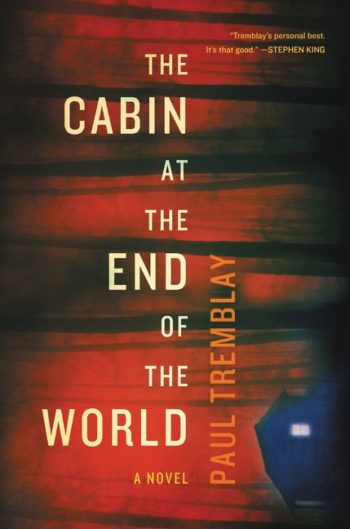
JJ: I saw that you reside in Massachusetts, but you are from Aurora, Colorado. Have the mass shootings in Colorado had any impact on your writing?
PT: My father was briefly in the Air Force, stationed in/near Denver when I was born. We moved to Beverly, MA, when I was less than a year old, so I have no memory of living in Colorado, and I’ve only visited the state once (as a guest of The Telluride Horror Show film festival in 2018).
It’s hard to say how the prolific mass shootings in the US have directly affected my writing. In my day-to-day I’m more affected as a teacher (particularly when we run lockdown drills; I wrote an essay about it once) and as a parent. It’s ludicrous and insane that we, the American public, are expected to live with mass shootings as though they are nothing but a stormy weather pattern when a solution is so obvious but untenable to a giant swath of the population that revels in a poisonous tough-guy frontiersman American fantasy and believes God is a packing-heat God and wants us, nay, calls us to be there to shoot the ‘bad guy’ for Jesus.
JJ: What is the one thing about you that is constantly misunderstood?
PT: It’s inevitable for all writers that some readers will misunderstand what you wrote, but I’m not my writing. I will say that it feels like I live two totally separate existences with teaching and writing. I think people at my school would be surprised to see me or how I am at a reading or a convention. My writing friends would probably be surprised if they watched me teach or coach for a bit. Especially the coaching part. I get, um, competitive. I try not to think about it because I worry that I’m somehow disappointing both sets of people. That split messes with my head sometimes, in a would-the-real-Paul-stand-up kind of way.
Oh, I do want to add, for the record, when John Langan insists I threw a chair after losing in Mafia at Readercon, that’s his misunderstanding (a too nice a way of putting it. Exaggeration or lie might be better.) Aggrieved and correct in asserting who was in fact in the mafia (no one ever listens to me), proud villager that I was, I stood and while athletically straightening my legs, I knocked the chair backward and over with the backs of my knees (I am tall). That’s hardly me throwing a chair, Langan.
JJ: I love a good John Langan story! How would your friends describe you?
PT: Oh. See above? I don’t know. Sometimes I’m goofy and manic and try to make people laugh. Sometimes I’m sullen and sensitive and quick to take offense. I’m probably being too hard on myself given the quality of people who I’m impossibly fortunate to count as friends. Hopefully, I can be counted on and I’m fun to be around. I try, anyway.
JJ: What are the top five books you always recommend?
PT: In the last couple years, I’ve typically recommended Things We Lost in the Fire by Mariana Enriquez, She Said Destroy by Nadia Bulkin, The Only Good Indians by Stephen Graham Jones, Plain Bad Heroines by Emily Danforth, and Under Majordomo Minor by Patrick deWitt.
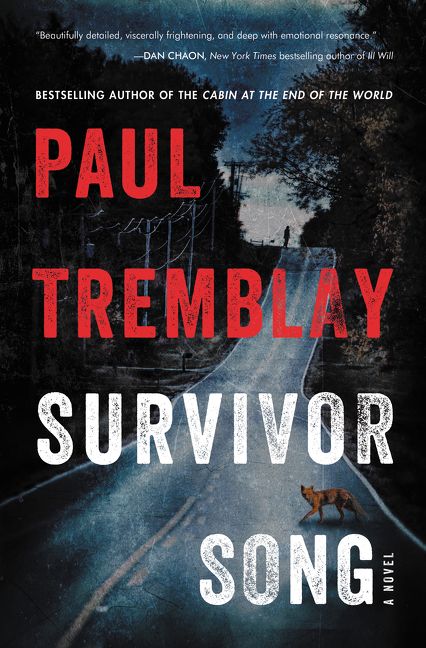
JJ: What are you reading now? What future publication are you most looking forward to reading?
PT: I recently finished Bunny by Mona Awad and You Love Me by Caroline Kepnes and both were so much macabre fun. I had the opportunity to read an early copy of Build Your House Around My Body by Violet Kupersmith and I will be telling everyone to read it when it comes out this summer. So good.
I can’t wait to read Brian Evenson’s forthcoming collection and Mariana Enriquez’s novel.
JJ: Do you have any current projects in the works? Any announcements you’d like to make?
PT: In July the trade paperback of my novel Survivor Song comes out. It includes a 2000 word essay about the writing of the book and then having it published during a pandemic (I’m quite proud of the essay, if I’m allowed to say that). In September, the mass market paperback of Survivor Song will hit. I have a short story called “The Party” in the Ellen Datlow-edited anthology When Things Get Dark, stories inspired by Shirley Jackson.
Later in ’21, the ARCs of The Pallbearers’ Club should be sneaking out there with the book itself to be published in summer of ’22. I’m nervously excited for that one. It might be my best, but I’m a lousy judge of my own stuff.
JJ: Paul, thank you very much for agreeing to answer my millions of questions. It has been an honor to chat with you, and I got to learn a few things! For instance, you have a new book coming out called The Pallbearer’s Club! Holy kittens, I’m beside myself with excitement. Well, Mr. Paul Tremblay, I hope you find a nice dark bar with a good band soon. Cheers!

